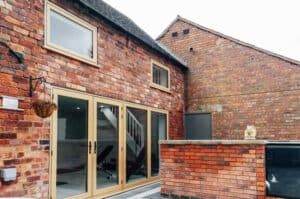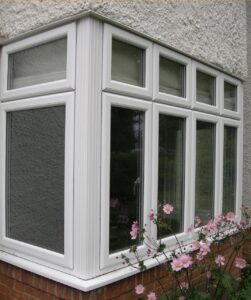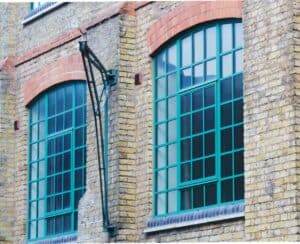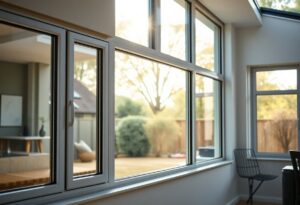Over time, you may find that outside noise significantly hinders your productivity in your home office. Implementing acoustic windows can dramatically improve your environment by reducing unwanted sound, allowing for better focus and concentration. These windows not only enhance your working conditions but also contribute to your mental well-being by creating a quieter and more serene atmosphere. In this post, we will explore the benefits of acoustic windows and how they can transform your workspace into a haven of productivity.
Understanding Acoustic Windows
For those seeking a quieter workspace, acoustic windows offer an effective solution. Designed specifically for sound attenuation, these windows differ from standard models in their materials and construction. They typically feature thicker glass panes and enhanced sealing, minimising outside noise and creating an environment conducive to concentration. (Choosing the right acoustic window can significantly impact your productivity.)
Definition and Purpose
With a focus on reducing noise pollution, acoustic windows serve to improve your work environment by providing effective sound insulation. Unlike standard windows, they utilise specialised materials, such as laminated glass, and advanced engineering to diminish sound transmission. This ultimately allows for enhanced focus and fewer distractions while working at home. (Investing in quality acoustic windows is integral for a productive home office.)
Types of Acoustic Windows
With several options available, you can select from various types of acoustic windows, including single-pane, double-pane, laminated glass, and specialty windows. Each option has its pros and cons, impacting both cost and effectiveness. For instance, double-pane windows offer better sound insulation than standard options, while laminated glass provides an optimal balance of cost and noise reduction. (Evaluating your specific needs is vital when choosing the right type of acoustic window.)
| Type | Pros and Cons |
|---|---|
| Single-pane | Minimal cost, low sound insulation |
| Double-pane | Better insulation, higher cost |
| Laminated glass | Excellent sound reduction, higher weight |
| Specialty windows | Customisable, potentially expensive |
| Standard | Widely available, poor sound insulation |
Knowing the various types of acoustic windows will help you make an informed decision, ultimately enhancing your comfort and concentration in your home office. Selecting the right one can significantly influence your overall productivity. Explore the options and invest in a solution that meets your specific sound-proofing needs.

Benefits of Acoustic Windows in Home Offices
If you’re seeking a solution to improve your work concentration, Acoustic Pods | quiet office pods to work in may provide the ideal environment. Acoustic windows not only minimise noise pollution but also create a serene workspace that can significantly boost your productivity and focus.
Enhanced Focus and Productivity
For many individuals, reduced noise levels in the workspace lead to improved concentration and decreased stress, which can enhance overall work performance. Research has shown that quieter environments can foster a deeper level of focus, allowing you to tackle tasks more efficiently and effectively (consider investing in acoustic solutions for your home office).
Better Health and Well-Being
Behind the impact of a quiet workspace lies its significant correlation with mental health. A serene environment can reduce fatigue and anxiety, promoting a sense of well-being that is vital for your overall wellness (creating a calm workspace should be a priority for your health).
Benefits include lower stress levels and a more balanced state of mind, which contribute to higher productivity. A peaceful setting helps you recharge and fosters creativity without the constant pressure of disruptive sounds, leading to a sustainable work-life balance (consider upgrading your home office with soundproofing solutions).
Installation Process
Clearly, the installation process for acoustic windows involves careful planning and execution to ensure optimal performance. It is advisable to assess your current window conditions first, considering factors like insulation and existing noise levels. Then, determine whether you require professional assistance based on your findings. Next, create a timeline and budget for the installation, ensuring you gather all necessary materials and tools ahead of time. This preparation will facilitate a smooth installation and help achieve the best results for your home office.
Planning and Preparation
Above all, effective planning and preparation are necessary for a successful acoustic window installation. Start by evaluating your current windows to identify any issues that may hinder insulation. It may be beneficial to consult with a professional to assist in this assessment, especially if you’re unsure about the condition of your windows. Following this, outline your goals for noise reduction, and determine whether you will handle the installation yourself or hire experts for the task.
Choosing the Right Professionals
Professionals play a vital role in ensuring proper installation of acoustic windows. When dicking out contractors or specialists, prioritize their experience and read customer reviews to gauge past performance. Ensure that they have a strong understanding of acoustic principles and window standards. It’s important to obtain multiple quotes to compare services, as this will inform your decision-making process. (Choosing wisely can significantly affect the effectiveness of your sound insulation.)
Professionals should not only possess relevant qualifications but also a proven track record in handling acoustic window installations. Be sure to ask for case studies or references from previous clients to validate their experience. It can be advantageous to choose contractors who offer warranties or guarantees on their work, as this can provide peace of mind. (The right contractor will be proficient in overcoming potential challenges that may arise during installation.)
Hence, selecting the right professionals is key to enhancing your home’s acoustics. Be vigilant about checking credentials and don’t hesitate to ask probing questions about their methodologies. This decision can influence not only the quality of your installation but also your overall satisfaction with the results. It’s vital to avoid low-cost options that may compromise quality, since improper installation can lead to inefficiencies in sound reduction.
Other Soundproofing Solutions for Home Offices
All effective soundproofing strategies can enhance your home office environment, ensuring a more productive workspace. Alongside acoustic windows, consider integrating multiple solutions such as strategic furniture placement, using rugs to absorb sound, and incorporating sound-absorbing materials like foam panels or curtains. Each element contributes to creating a quieter atmosphere, allowing you to concentrate better on your tasks. (Assessing which solution works best for your space is vital.)
Furniture and Layout Adaptations
With some thoughtful furniture placement and layout adaptations, you can significantly reduce noise disruption in your home office. Position heavier furniture, such as bookshelves and sofas, against shared walls to act as a sound barrier. Adding soft furnishings, such as rugs and cushions, can absorb sound waves, creating a more serene environment. (Consider the flow of your workspace while deciding on the layout.)
DIY Soundproofing Options
Against the backdrop of installing acoustic windows, you can explore cost-effective DIY strategies to bolster soundproofing. Options include sealing gaps and cracks with weatherstripping, using thick curtains or soundproof blankets, and even adding mass to your walls with additional layers of drywall. This approach allows you to tailor your space without significant financial investment. (Weighing the effectiveness of each DIY method is imperative for achieving your desired results.)
The possibilities for DIY soundproofing are vast and can suit various budgets and skill levels. You might also consider incorporating double-sided tape to secure heavy drapes or even applying acoustic caulk to edges and corners for better sound isolation. While some efforts may deliver immediate results, others could require patience for optimal effectiveness. (Evaluating the longevity of your soundproofing methods will aid in maintaining an efficient workspace.)
Cost Considerations
Once again, when contemplating acoustic windows for your home office, cost is an crucial factor to weigh. The initial outlay for these windows can be significant, but it is vital to consider the potential savings and benefits over time. Investing in acoustic windows not only enhances your work environment but can also lead to a rise in property value, making it a financially sound choice in the long run.
Initial Investment vs. Long-Term Benefits
One way to assess the value of acoustic windows is to compare the initial investment with the long-term benefits. Although the upfront cost can be substantial, the improvement in work productivity and comfort is often worth it. Additionally, these windows may increase the value of your property should you decide to sell, offering both satisfaction and financial security in the future.
Available Incentives and Rebates
An array of incentives and rebates may be available to you when investing in soundproofing improvements like acoustic windows. Local governments and energy efficiency programmes often provide tax credits or rebates, making it easier for homeowners to upgrade their properties while saving money in the process.
Cost considerations can be significantly eased through various incentives available in your area. These incentives often encompass federal and state tax credits, while local utility companies may offer rebates for energy-efficient upgrades. Investigating these options can lead to a substantial reduction in your initial investment, making it a smart financial move as well as a step towards creating a better work environment.
Conclusion
With this in mind, incorporating acoustic windows into your home office can significantly elevate your ability to concentrate. By minimising external noise distractions, you create a more serene work environment that fosters productivity and focus. Investing in high-quality acoustic solutions will not only enhance your work performance but also contribute to your overall well-being. Therefore, consider upgrading your space with the right acoustic windows to ensure that your home office is a sanctuary for your productivity.
FAQ
Q: What are acoustic windows?
A: Acoustic windows are specially designed windows that minimise external noise, improving sound insulation. They typically feature double or triple glazing and utilise specific materials to effectively reduce sound transmission, making them ideal for home offices situated in noisy environments.
Q: How do acoustic windows enhance concentration?
A: By significantly reducing noise from outside, acoustic windows create a quieter and more focused work environment. This reduced auditory distraction allows individuals to concentrate better on their tasks, leading to increased productivity and improved work quality.
Q: Can acoustic windows be installed in any type of property?
A: Yes, acoustic windows can be installed in various types of properties, including residential homes and commercial buildings. However, the installation process may vary depending on the existing window structure and the specific acoustic solution required.
Q: Are acoustic windows effective against all types of noise?
A: While acoustic windows are highly effective against many types of noise, particularly traffic and construction sounds, the degree of soundproofing can vary based on the frequency and source of the noise. They are particularly beneficial for low to mid-frequency noises, such as voices and vehicle engines.
Q: Will acoustic windows make my home office completely soundproof?
A: Acoustic windows can significantly reduce noise levels, but they may not provide complete soundproofing on their own. Combining them with other soundproofing measures, such as insulation and strategic room layout, can further enhance the sound environment in your home office.
Q: Do acoustic windows require special maintenance?
A: Acoustic windows do not require extensive maintenance beyond typical window care. Regular cleaning of the glass surfaces and ensuring that seals remain intact are generally sufficient to maintain their soundproofing capabilities and appearance.
Q: How do I choose the right acoustic windows for my home office?
A: When dicking out acoustic windows, consider factors such as the level of noise reduction needed, the window’s Rw rating (which measures sound insulation), and the aesthetics that match your home office design. Consulting with a specialist can also provide insights into the best options tailored to your specific environment.













